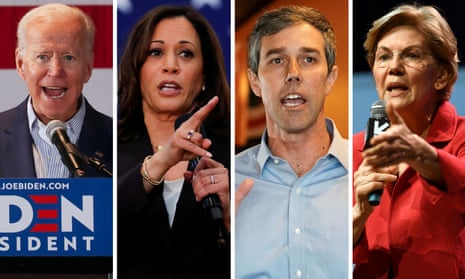The Republican primary debates in 2015 featured 17 candidates – a number interpreted as unwieldy at best and, at worst, a bit ridiculous.
Well step aside, Republicans, because this year Democrats have gone one better. Or three better: over the evenings of 26th and 27th June, 20 presidential hopefuls will have it out on stage, as they attempt to sell themselves as the one Democratic candidate to take on Donald Trump in the 2020 US presidential election.
This is the public’s first chance to see all the major Democratic candidates in action against each other, and more female contenders will take part than ever before in US history.
In recent times primary and presidential TV debates have presented us with such moments as Rick Perry forgetting which government department he was going to abolish (it was the energy department; he is now the head of it), and Donald Trump repeatedly looming, predator-like, behind Hillary Clinton.
Will the Democratic National Committee (DNC) debates come close to that kind of excitement? We don’t know yet. But this is what we do know.
When is this happening? And where?
Wednesday and Thursday night, of course. The Democrats debate between 9-11pm EDT in a double-header. Both nights will be live on TV – specifically NBC – and on the cable channels MSNBC and Telemundo. The debates will also be streamed on NBCNews.com, and on Facebook, Twitter and YouTube.
Before Wednesday night, most analysts anticipated each candidate would have about 8-10 minutes of speaking time. Instead, the amount of time given to each person on stage varied wildly. Cory Booker got 10.9 minutes, Washington governor Jay Inslee, just five.
The debates are being held in the Adrienne Arsht Center for the Performing Arts in downtown Miami. The fact Florida is a swing state crucial to the 2020 election is surely just a happy coincidence.
Who is appearing?
On Thursday, it’s the turn of frontrunner Joe Biden; Vermont senator Bernie Sanders; California senator Kamala Harris; South Bend’s mayor, Pete Buttigieg; New York senator Kirsten Gillibrand; Colorado senator Michael Bennet; former Colorado governor John Hickenlooper; California congressman Eric Swalwell; entrepreneur Andrew Yang and author Marianne Williamson.
On Wednesday, it was Elizabeth Warren, Beto O’Rourke, Booker and Amy Klobuchar will be duelling it out. Oh, and also: Washington’s governor, Inslee; former housing and urban development secretary Julián Castro; Hawaii representative Tulsi Gabbard; New York City’s mayor, Bill de Blasio; Ohio congressman Tim Ryan and former Maryland congressman John Delaney.
How were they chosen?
There are 20 candidates, split over two nights, meaning four hours of hot debate action. The bar for entry was set relatively low, which contributed to the throng: to qualify, candidates only needed to achieve 1% in three national polls, or receive more than 65,000 individual donations.
Of the 20 candidates, the DNC mixed them at random – but with the stipulation that five of the top 10 candidates appear on each night. It’s different from Republican 2016 strategy, when the weakest candidates held their own debates before the main event. The “kid’s table” was largely ignored, and roundly mocked.
What are they going to discuss?
The DNC has promised questions about the climate crisis, which were conspicuously absent from the presidential debates in 2016. Many of the candidates have said they support the ambitious Green New Deal, but some of the more centrist types – including Biden – are holding off. Also expect quizzing on healthcare, a real point of differentiation where some contenders support Medicare for All, some are only up for improving Obamacare, and others are somewhere in the middle.
Expect other big topics such as college fees, student loans, impeachment and border security. The DNC has been at pains to promote this as a more serious debate than we have seen from Republicans in recent times: “We’re not going to be talking about hand size,” the DNC chairman ,Tom Perez, told Vox. He was referencing a 2015 Republican debate where Marco Rubio made a quip about Trump’s allegedly small hands, and Trump responded by defending the size of his penis.
Who is in charge?
The debates will be moderated by five fixtures of the NBC News stable: NBC Nightly News host Lester Holt, Meet the Press moderator Chuck Todd, MSNBC host Rachel Maddow, Noticias Telemundo host José Díaz-Balart and Today co-anchor Savannah Guthrie.
Who needs this the most?
Anyone who isn’t Biden, Sanders, Warren and possibly Buttigieg will be desperate for a standout performance. The rest of the field, including well-known candidates like O’Rourke, Harris and Booker, are flailing in the polls and need some sort of shot in the arm to boost them in terms of exposure, fundraising and, ultimately, votes.
... and the least?
Biden. As the frontrunner – he has been ahead in every poll since he announced his candidacy – Biden has the most to lose. So far he has been running a campaign which essentially ignores all the other candidates, and just pits him against Trump. Here he will be forced to actually engage with his Democratic rivals, who may confront him over things like his past positions on school bussing, and his working with segregationists in the Senate.
Biden has a long history of putting his foot in his mouth. A gaffe during the debate, on national TV, might make people at least begin to question their support for the former vice-president.
